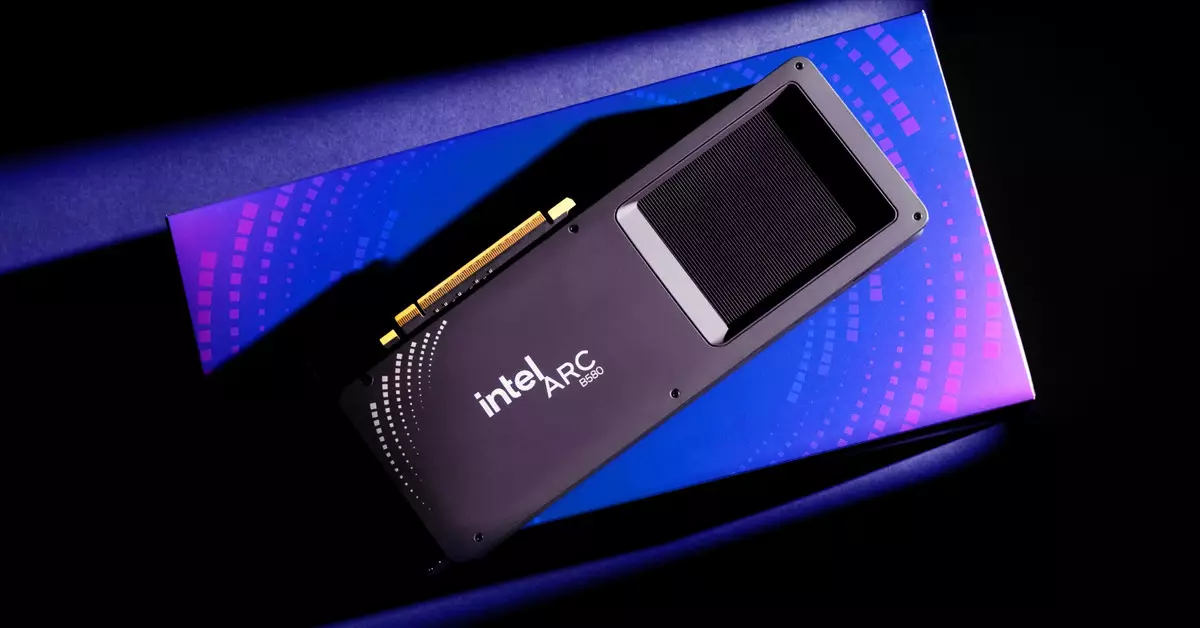Intel has been on a rocky journey through the unforgiving landscape of the graphics card market. For a company long synonymous with computing prowess, the past few years have posed unique challenges, forcing it to struggle in a domain heavily dominated by established players like Nvidia and AMD. Yet, amidst this chaos, a beacon of hope has emerged in the form of the recently launched Arc B580 “Battlemage” GPU, a product that has garnered noteworthy acclaim and shifted consumer expectations.
The introduction of the Arc B580 signals a significant turning point for Intel’s discrete graphics card initiative. After a series of setbacks, it appears that the company has finally found a product that resonates with both consumers and critics alike. Launched at a relatively modest price point of $250, the GPU has quickly garnered enthusiastic reviews and sparked intense demand. Reports indicate that retail stock has rapidly diminished, indicative of a market eager for an alternative to Nvidia and AMD’s offerings, which have come under fire for inflated prices and underwhelming performance.
One cannot overlook the fact that the B580 has emerged as a comparative anomaly against a backdrop of subpar offerings like Nvidia’s RTX 4060 and AMD’s RX 7600. The latter GPUs, criticized for their lackluster performance, have forced many gamers to reassess their buying decisions. In contrast, Intel’s new card brings a refreshing perspective with its competitive pricing and robust feature set, making it a compelling option for those looking to upgrade their gaming experience.
Performance: A Mixed Yet Positive Bag
Initial impressions of the Arc B580 reveal both strengths and weaknesses in its performance profile. While it may not consistently outperform its primary competitors in every game—especially for those still utilizing 1080p resolution—the average performance metrics suggest it holds its own. Notably, the GPU benefits from a more mature driver suite than its predecessors, and its generous allocation of 12GB of video RAM adds to its appeal, particularly for gamers running demanding applications or multiple tasks simultaneously.
Moreover, reviewers have underscored the B580 as an accessible option within a category riddled with overpriced underperformers. By providing good value for a reasonable price, it positions Intel as a brand whose products are not only desirable but also financially sensible, particularly in light of the volatile pricing trends seen in the GPU space in recent years.
In today’s consumer electronics market, availability often dictates a product’s success. Intel’s experience with the Arc B580 has been no exception, as the high demand has led to rapid sellouts at various retail outlets. This frenzy has raised questions about whether the B580 represents a “paper launch,” a strategy sometimes employed by companies to create buzz without sufficient stock to meet consumer interest. However, insights from industry analysts suggest otherwise. Steve Walton from Hardware Unboxed indicates that reports from manufacturers and retailers confirm substantial supply levels, which should ease some of the apprehensions regarding long-term availability.
Looking ahead, potential buyers are encouraged to remain vigilant for restocks, especially as Intel works to stabilize the supply chain. Retailers such as Newegg and B&H are expected to receive new shipments soon, giving hopeful gamers another chance to access this acclaimed hardware.
The Competitive Landscape Ahead
While the Arc B580’s launch is undoubtedly a significant milestone, it arrives at a time when AMD and Nvidia are reportedly on the brink of unveiling their next-generation GPUs. The competitive landscape is likely to become increasingly crowded, forcing Intel to innovate continuously and adapt to market shifts. With the graphics card industry in a perpetual state of flux, Intel must ensure that its offerings do not become obsolete in the face of rapid technological advancements from its competitors.
The Arc B580 represents more than just a product launch; it signifies Intel’s resilience and potential comeback in the discrete graphics sector. With a promise of solid performance at a fair price, it may indeed be the catalyst for shifting consumer preferences and re-establishing Intel as a formidable contender in the gaming hardware arena. Whether this GPU can maintain consumer interest in a competitive market remains to be seen, but its initial success lays the groundwork for what could be an exciting chapter in Intel’s storied history.

